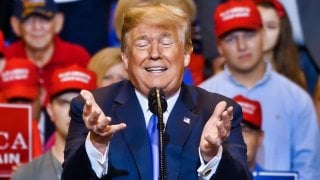Will Donald Trump Trigger a Debt and Dollar Crisis?
If Donald Trump wins next week’s election, he should at least moderate the size of the tax cut promises he made during the campaign and avoid exacerbating our twin deficit problem.
Albert Einstein is said to have remarked that “Insanity is doing the same thing over and over and expecting different results.” We have to wonder what he might have made of Donald Trump’s economic platform in his bid for another term in office. Mr. Trump is promising that, if elected, he would double down on his first term’s economic policies by being more aggressive than he was before, both with respect to import tariff hikes and tax rate cuts. Never mind that those policies resulted in a meaningful widening of both the trade and budget deficits during his presidency.
The two central economic planks of Mr. Trump’s first term in office were the increased imposition of import tariffs and the introduction of large tax cuts. Tariffs of between 10 and 25 percent were placed on $380 billion worth of imports from China, together with aluminum and steel import tariffs of a similar size on many of our trade partners. At the same time, corporate and income tax rates were cut in a major way by the 2017 Tax Cuts and Jobs Act. The Congressional Budget Office estimated that over a decade, those tax cuts would add around $1.5 trillion to the public debt.
The results of those policies fell far short of the Trump administration’s goals of eliminating the trade deficit, stimulating economic growth, and narrowing the budget deficit. Indeed, during the Trump presidency, the trade deficit in goods widened by some 20 percent to reach over $900 billion in 2020. Meanwhile, even before the 2020 Covid-induced recession, economic growth under the Trump presidency was little different from that of the Obama administration, while the budget deficit steadily increased before blowing out to 13.3 percent of GDP in 2020 as a result of the COVID-19 Pandemic.
Fast forward to today. Mr. Trump is proposing a 60 percent tariff on all imports from China and up to 20 percent tariff on all imports from the rest of our trade partners. At the same time, he is proposing to extend the Tax Cuts and Jobs Act, eliminate taxes on social security benefits, and reduce the corporate tax rate from 21 percent to 15 percent for companies that produce goods in the United States.
A key lesson that Mr. Trump failed to learn from his time as president is that the trade deficit is not driven by the level of import tariffs but rather by the shortfall in the country’s savings rate relative to its investment rate. So long as the country does not save enough to cover the level at which it invests, it will have a trade deficit. Armed with this knowledge, it should have come as no surprise that an increase in the size of the budget deficit that reduces the level of the country’s savings would manifest itself in a widening of the trade deficit. It will do so irrespective of the level at which tariffs are set on our trade partners.
If there is one thing that we can be sure about a second Trump term, it is that there will be a substantial worsening of our public finances. According to the Committee for a Responsible Budget, over the coming decade, the Trump tax cuts could add around $7.75 trillion to the public debt, which would rise to more than 140 percent of GDP. That would well exceed its corresponding level at the end of the Second World War.
With this kind of public finance outlook, our overall trade deficit is bound to rise. That, together with our clearly unsustainable public finances, risks inviting both foreign and domestic investors to lose faith in our government’s willingness and ability to repay the debt. That, in turn, could precipitate both a dollar crisis and a spike in long-term interest hopes.
We have to hope that should Mr. Trump win next week’s election, he will at least moderate the size of the tax cut promises he made during the campaign and avoid exacerbating our twin deficit problem. If not, we should brace ourselves for some very rough economic sledding in the year ahead.
About the Author:
Desmond Lachman is a Senior Fellow at the American Enterprise Institute and was a deputy director in the International Monetary Fund’s Policy Development and Review Department and the chief emerging-market economic strategist at Salomon Smith Barney.
Image: Creative Commons.


